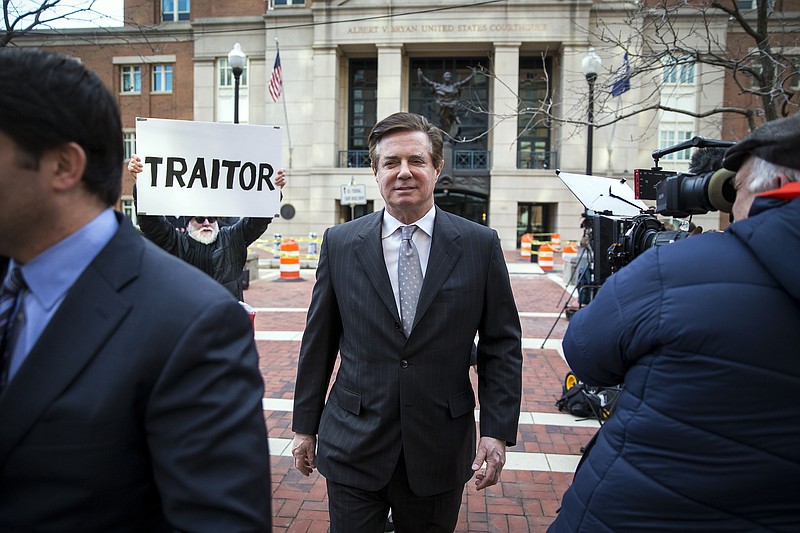No wonder Donald Trump is raging again about the special counsel.
That was the gist early this week in a column by The Washington Post's Paul Waldman, whose analysis of recent news about former Trump campaign manager Paul Manafort was titled in part: "It looks like a big day for collusion."
Special counsel Robert Mueller on Monday asked a federal court to immediately begin sentencing proceedings for Manafort because, despite agreeing to cooperate with investigators in the Russia probe, Manafort has continued to lie to federal authorities. At 69 and already jailed in Virginia for money laundering and tax fraud, perhaps Manafort still thinks he'll receive a presidential pardon.
Meanwhile, The Guardian had just written a story stating Manafort held secret talks with Julian Assange inside the Ecuadorian embassy in London, and visited around the time he joined Trump's campaign:
"Sources have said Manafort went to see Assange in 2013, 2015 and in spring 2016 - during the period when he was made a key figure in Trump's push for the White House."
The Guardian reported that shortly after the March 2016 visit, WikiLeaks released a stash of Democratic emails stolen by Russian intelligence officers.
Waldman, in his analysis, notes that if it's true Manafort met with Assange in the spring of 2016, "it would be almost ludicrous" to think they didn't discuss the stolen emails that WikiLeaks would soon release in order to damage Hillary Clinton's candidacy. "And if that were true," Waldman continues, "it would mean the Trump campaign - or at least the Trump campaign chairman - had advance knowledge of the centerpiece of the Russian effort to manipulate the 2016 election."
If that meeting is something Mueller will say Manafort lied about, then wouldn't it mean Mueller has direct evidence of collusion between the campaign and Russia?
If Trump's tweets Tuesday are an indication of his reaction, a one-word description of his response would be panic.
"The Phony Witch Hunt continues, but Mueller and his gang of Angry Dems are only looking at one side, not the other. Wait until it comes out how horribly & viciously they are treating people, ruining lives for them refusing to lie. Mueller is a conflicted prosecutor gone rogue ," Trump tweeted at 7:30 a.m.
Twelve minutes later he picked up the train of thought again in two more tweets: "The Fake News Media builds Bob Mueller up as a Saint, when in actuality he is the exact opposite. He is doing TREMENDOUS damage to our Criminal Justice System, where he is only looking at one side and not the other. Heroes will come of this, and it won't be Mueller and his terrible Gang of Angry Democrats. Look at their past, and look where they come from. The now $30,000,000 Witch Hunt continues and they've got nothing but ruined lives. Where is the Server? Let these terrible people go back to the Clinton Foundation and "Justice" Department!"
Other pundits speculate that Mueller's team delayed Manafort's cooperation and sentencing status report long enough to get President Trump's written answers to Mueller's questions, answers that Trump bragged he wrote himself.
Chief among those pundits is Emptywheel blogger Marcy Wheeler, who asserts that Mueller's team "appears to have no doubt that Manafort was lying to them. That means they didn't really need his testimony, at all. It also means they had no need to keep secrets - they could keep giving Manafort the impression that he was pulling a fast one over the prosecutors, all while reporting misleading information to Trump that he could use to fill out his open book test. Which increases the likelihood that Trump just submitted sworn answers to those questions full of lies."
You may recall that the infamous dossier written by the former MI6 officer Christopher Steele asserts that Manafort was at the crux of a "well-developed conspiracy of cooperation" between the Trump campaign and Russia's leadership. The two sides had a mutual interest in defeating Clinton, Steele wrote, whom Putin "hated and feared."
The Guardian's story certainly recalled the dossier, and of it wrote: "In a memo written soon after the DNC emails were published, Steele said: 'The [hacking] operation had been conducted with the full knowledge and support of Trump and senior members of his campaign team.' "
Mueller's indictments (and court briefings) have been termed "speaking indictments" because they so often lay out quite plainly - replete with undeniable documentation - the story and proof of wrongdoing.
That said, we cannot wait for Mueller to present his briefing argument to the federal court laying out the case that Manafort lied to investigators even after he entered a plea agreement promising to cooperate with them and tell the whole truth.
As Waldman's analysis concludes: "If that document is made public, we'll learn what he said, what the truth is, and perhaps who he's covering up for. And then Trump may have even more reason to be angry."
